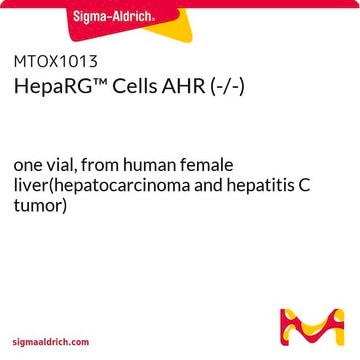ADD651C
HepaRG™ Serum Free Induction Medium Supplement
Se connecterpour consulter vos tarifs contractuels et ceux de votre entreprise/organisme
About This Item
Code UNSPSC :
12352207
Nomenclature NACRES :
NA.71
Produits recommandés
Forme
liquid
Conditions d'expédition
dry ice
Température de stockage
−20°C
Description générale
Biopredic′s HepaRG Serum Free Induction Medium Supplement with Antibiotics can be used with all HepaRG cell lines. See user guide for detailed protocols.
Informations légales
Use of this product is subject to one or more license agreements.
HepaRG cells are patented and their use is strictly limited; consider the cells as a single use, disposable product that must be destroyed upon conclusion of a study or experiment. Propagating, reproducing, cloning, subcloning or any other use of the cells following the conclusion of a study is prohibited. Use of the cells to produce or manufacture commercial products for general sale or for use in the manufacture of products intended for general sale is prohibited. Transfer of the cells to anyone not employed within the same organization, whether for financial benefit or not, is prohibited. If you are unwilling to accept the terms of this LIMITED USE LICENSE, do not ORDER or use them, and immediately return the cells for credit. Violators of this Limited Use License will be prosecuted to the fullest extent of the law.
HepaRG cells are patented and their use is strictly limited; consider the cells as a single use, disposable product that must be destroyed upon conclusion of a study or experiment. Propagating, reproducing, cloning, subcloning or any other use of the cells following the conclusion of a study is prohibited. Use of the cells to produce or manufacture commercial products for general sale or for use in the manufacture of products intended for general sale is prohibited. Transfer of the cells to anyone not employed within the same organization, whether for financial benefit or not, is prohibited. If you are unwilling to accept the terms of this LIMITED USE LICENSE, do not ORDER or use them, and immediately return the cells for credit. Violators of this Limited Use License will be prosecuted to the fullest extent of the law.
HepaRG is a trademark of BioPredic International company
Code de la classe de stockage
10 - Combustible liquids
Classe de danger pour l'eau (WGK)
WGK 2
Point d'éclair (°F)
Not applicable
Point d'éclair (°C)
Not applicable
Certificats d'analyse (COA)
Recherchez un Certificats d'analyse (COA) en saisissant le numéro de lot du produit. Les numéros de lot figurent sur l'étiquette du produit après les mots "Lot" ou "Batch".
Déjà en possession de ce produit ?
Retrouvez la documentation relative aux produits que vous avez récemment achetés dans la Bibliothèque de documents.
Lindsey M Ott et al.
SLAS discovery : advancing life sciences R & D, 22(5), 614-625 (2017-03-28)
Drug-induced liver injury (DILI) and drug-drug interactions (DDIs) are concerns when developing safe and efficacious compounds. We have developed an automated multiplex assay to detect hepatotoxicity (i.e., ATP depletion) and metabolism (i.e., cytochrome P450 1A [CYP1A] and cytochrome P450 3A4
Catherine C Bell et al.
Drug metabolism and disposition: the biological fate of chemicals, 45(4), 419-429 (2017-02-01)
Reliable and versatile hepatic in vitro systems for the prediction of drug pharmacokinetics and toxicity are essential constituents of preclinical safety assessment pipelines for new medicines. Here, we compared three emerging cell systems-hepatocytes derived from induced pluripotent stem cells, HepaRG
Beth Williamson et al.
Pharmacology research & perspectives, 4(5), e00264-e00264 (2016-10-08)
The nuclear pregnane X receptor (PXR) regulates the expression of genes involved in the metabolism, hepatobiliary disposition, and toxicity of drugs and endogenous compounds. PXR is a promiscuous nuclear hormone receptor (NHR) with significant ligand and DNA-binding crosstalk with the
Maxime Demazeau et al.
International journal of pharmaceutics, 524(1-2), 268-278 (2017-04-04)
In this study, we evaluated cationic liposomes prepared from diether-NH
Takafumi Tomida et al.
Journal of applied toxicology : JAT, 37(3), 382-390 (2016-08-03)
The approach for predicting the degree of drug-induced liver injury (DILI) risk was investigated quantitatively in a modified multiparametric assay using HepaRG cells. Thirty-eight drugs were classified by DILI risk into five categories based on drug labels approved by the
Notre équipe de scientifiques dispose d'une expérience dans tous les secteurs de la recherche, notamment en sciences de la vie, science des matériaux, synthèse chimique, chromatographie, analyse et dans de nombreux autres domaines..
Contacter notre Service technique




